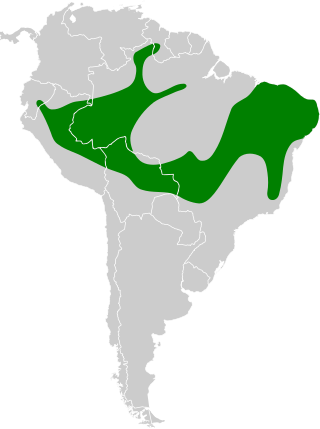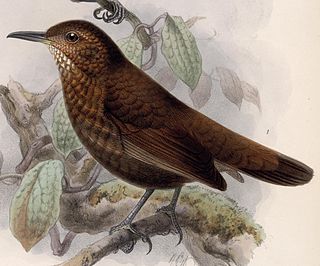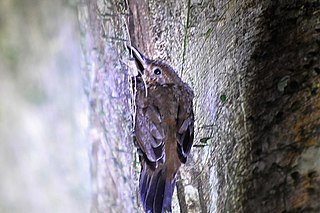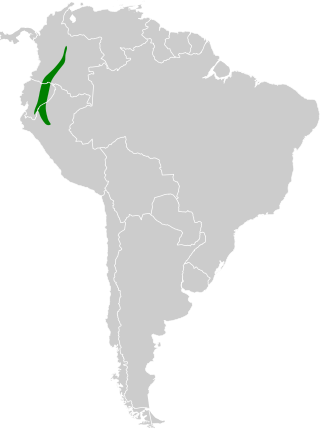
The chestnut-capped puffbird is a species of bird in the family Bucconidae, the puffbirds, nunlets, and nunbirds. It is found in Bolivia, Brazil, Colombia, Ecuador, Peru, and Venezuela.

The chestnut-headed crake is a species of bird in subfamily Rallinae of family Rallidae, the rails, gallinules, and coots. It is found in Bolivia, Brazil, Colombia, Ecuador, and Peru.

The ochre-throated foliage-gleaner is a species of bird in the Furnariinae subfamily of the ovenbird family Furnariidae. It is found in Panama and every mainland South American country except Argentina, Chile, Paraguay, and Uruguay.

The pale-legged hornero is a species of bird in the Furnariinae subfamily of the ovenbird family Furnariidae. It is found in Bolivia, Brazil, Guyana, and Peru.

The eastern woodhaunter, also known as the Amazonian woodhaunter, is a species of bird in the Furnariinae subfamily of the ovenbird family Furnariidae. It is found in Bolivia, Brazil, Colombia, Ecuador, Peru, and Venezuela.

The chestnut-winged foliage-gleaner is a species of bird in the Furnariinae subfamily of the ovenbird family Furnariidae. It is found in Bolivia, Brazil, Colombia, Ecuador, Peru, and Venezuela.

The grey-throated leaftosser is a Near Threatened species of bird in the subfamily Sclerurinae, the leaftossers and miners, of the ovenbird family Furnariidae. It is found in Bolivia, Brazil, Colombia, Costa Rica, Ecuador, Panama, Peru, Trinidad and Tobago, and Venezuela.

The black-tailed leaftosser is a species of bird in the subfamily Sclerurinae, the leaftossers and miners, of the ovenbird family Furnariidae. It is found in Bolivia, Brazil, Colombia, Ecuador, French Guiana, Guyana, Peru, Suriname, and Venezuela.

The scaly-throated leaftosser is a species of bird in subfamily Sclerurinae, the leaftossers and miners, of the ovenbird family Furnariidae. It is found in Mexico, every Central American country except El Salvador, and in Colombia and Ecuador.

The tawny-throated leaftosser is a tropical American bird species in subfamily Sclerurinae, the leaftossers and miners, of the ovenbird family Furnariidae. It is also known as the Middle American leaftosser and less frequently as tawny-throated leafscraper, Mexican leaftosser or Mexican leafscraper. It is found from Mexico to Panama.

The short-billed leaftosser is a species of bird in the subfamily Sclerurinae, the leaftossers and miners, of the ovenbird family Furnariidae. It is found in Bolivia, Brazil, Colombia, Ecuador, French Guiana, Guyana, Peru, Suriname, and Venezuela.

The rufous-breasted leaftosser is a species of bird in the subfamily Sclerurinae, the leaftossers and miners, of the ovenbird family Furnariidae. It is found in Argentina, Brazil, and Paraguay.

Cabanis's spinetail is a species of bird in the Furnariinae subfamily of the ovenbird family Furnariidae. It is found in Brazil, Bolivia, and Peru.

The chestnut-throated spinetail is a species of bird in the Furnariinae subfamily of the ovenbird family Furnariidae. It is mainly found in Bolivia, Brazil, Colombia, Ecuador, and Peru.

McConnell's spinetail is a species of bird in the Furnariinae subfamily of the ovenbird family Furnariidae. It is found in Brazil, French Guiana, Guyana, Suriname, and Venezuela.

The dusky spinetail is a species of bird in the Furnariinae subfamily of the ovenbird family Furnariidae. It is found in Colombia, Ecuador, and Peru.

The whiskered wren is a species of bird in the family Troglodytidae. It is found in Colombia, Ecuador, and Venezuela.

The white-throated woodcreeper is a species of bird in the subfamily Dendrocolaptinae of the ovenbird family Furnariidae. It is found in Argentina, Brazil, and Paraguay.

The strong-billed woodcreeper is a species of bird in the subfamily Dendrocolaptinae of the ovenbird family Furnariidae. It is found in Belize, Bolivia, Brazil, Colombia, Costa Rica, Ecuador, El Salvador, Guatemala, Guyana, Honduras, Mexico, Nicaragua, Panama, Peru, and Venezuela.

The ocellated woodcreeper is a species of bird in the subfamily Dendrocolaptinae of the ovenbird family Furnariidae. It is found in Bolivia, Brazil, Colombia, Ecuador, Peru, and Venezuela.





















